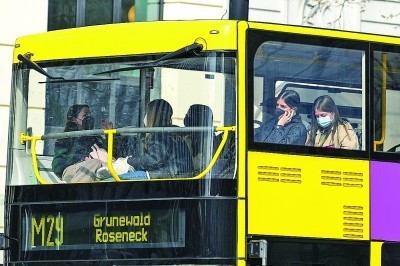Proficiency workers lack start to trouble Germany
Author:Guangming Daily Time:2022.09.24

During the new crown epidemic, people wore a mask in Berlin, Germany to take a bus. Xinhua News Agency
[Reporter connection]
Germany has canceled more than 90 % of the epidemic prevention measures, but the goal of restoring the economy after the epidemic is still difficult to achieve. An important reason is that Germany lacks qualified labor everywhere -professional and technical workers and skilled workers who have been trained well.
The current situation of the service industry in Germany and the daily life of ordinary people can most intuitively reflect this. During the outbreak of the new coronary pneumonia, the airlines and catering industry closed their business, and a large number of employees were fired. In the hospital, many overwork nurses have resigned. Now re -production and re -production, but these industries are facing the difficulties that old employees cannot return and new employees cannot be recruited.
Many Germans intuitively feel that the quality of life has dropped significantly. In the just summer vacation, the German airport management was chaotic, no one managed on the cargot on the conveyor belt, and the security check was long -term. The reasons were insufficient. The pharmacy has to shorten the business time because of the lack of professional hands, and the restaurant has declined due to the serious deficiency of the service staff. A boss even posted a notice to ask guests to treat the waiter well because "the waiter is more difficult to find than the guests." Some nursing homes and hospitals even stated that because of lack of qualified nurses, they cannot provide services that meet the requirements of "humanity".
Finding the right labor force has become the biggest problem
Judging from the figures released by the Labor Bureau, too many jobs are still not found to be a suitable worker. Although at least 540,000 Ukrainians also registered for a job in Germany and expanded the source of labor, they lack corresponding training and it is difficult to find the right job.
In Germany, it is difficult for those who have not received vocational education and training to find a suitable job. German vocational education implements a dual -track system. Students who receive vocational education are studying at school in half of the time. The other half of the time in training posts provided by the enterprise will be learned from an experienced master. Many of the training positions provided by the enterprise now have vacant personnel, indicating that there are insufficient personnel who receive vocational education.
Recently, the German Labor Bureau lists the so -called "bottleneck occupation" list, covering 148 occupations including breaders, elderly caregivers, and mirrorists, and almost lacks professional and technical workers. Because of the lack of professional and technical workers, many federal government policies have been unable to implement. For example, in order to suppress the soaring rents in Germany, 1.6 million new apartments are required; in order to allow Germany to continue to be "good students" in curbing climate change operations, plan to lay and transform railways, add insulation layers to housing, and transform the heating system ... However, where to find enough, suitable people to do these work has become the biggest problem.
Professional and technical workers' shortage innovative high
At the end of August, the federal government held a two -day closed -door meeting in the Messeberg Palace on the suburbs of Berlin to discuss major issues facing the government before, such as the energy crisis, the conflict between the Russia and Ukraine, and the security of the supply chain. However, the reporter noticed that during the meeting, the Minister of Labor Haier, the Minister of Education Stark Vasisinger, and the Family Minister Boce both expressed concern about the current shortage of professional and technical workers facing Germany at the joint press conference. Haier said that this fall, the federal government is expected to introduce a strategic document to solve the problem of professional labor shortage. But he warned that in the next few years, the impact of this problem will become increasing. Stark Vezenegger also emphasized that it is necessary to strengthen the lack of technical workers by strengthening vocational education. She said that to allow vocational education to regain their due glory, "vocational education and academic education are different, but both are equal, and both are needed."
Data from the IFO Institute of Economics of Munich, the current shortage of German technical workers has reached a new height. In July, almost half of the companies were affected because they could not find appropriate employees. The institute has conducted this survey since 2009. The current number is higher than ever before. Most companies believe that the shortage of technical workers is their largest business risk in the future, and it will even cause their business to stop. The Federal Labor Bureau believes that most of the current positions are distributed in the transportation industry, logistics fields and sales areas. About 881,000 positions appeared in July, an increase of 18%over the same period last year.
The impact of the epidemic is the most direct reason for the shortage of current technical workers in Germany. Many workers who were fired during the epidemic transferred to other industries, and it is difficult to return to their original positions now. The Federal Labor Bureau preliminarily evaluated that 390,000 people began new jobs in the catering and hotel industry in 2020. Many of them were originally engaged in professional work such as sales, logistics and corporate management.
Research institutions said that as early as the popularity of the new crown virus, the number of people in German technical workers lacking people has been steadily increasing, and this phenomenon will be even more severe in the future. The changes in the age structure of the population are the basic reasons. At present, a generation born in the late 1950s and early 1960s is about to leave the labor market quickly. Although people who reach the retirement age still account for a small part of the total population, this proportion will rise rapidly in the next few years, and fewer and fewer newborn children will become less and less. At the same time, the German employment market will not become smaller.
Immigration is not a pitch to solve the problem
Recently, some industries in Germany have mainly relied on the lack of labor for migrants, especially technical immigrants from Eastern Europe have played a significant role. In 2021, about 1.9 million foreigners came to work in Germany, and most of them came from other EU countries. However, the professional research department believes that there will be fewer and fewer people from other EU countries in the next few years. Germany requires at least 400,000 technology immigrants each year to make up for the negative consequences of the German population change to the labor market. The German politics also hopes to use technical workers' immigration to alleviate the current labor shortage. In March 2020, the German "Technical Workers' Immigration Law" took effect. This law no longer emphasizes that immigrants have received university education as in the past, so that vocational education from non -EU countries is more likely to come to Germany for employment. However, so far, the law has not played. To a certain extent, it is because the epidemic restricts the flow of global personnel; but experts also point out that immigration can delay the lack of qualified labor, but it is definitely not a "pirate medicine".
Experts believe that the role of vocational education in solving the shortage of technical workers should still be emphasized. Send people in Germany drop out of school every year without school. According to the Federal Bureau of Statistics, 47,000 students dropped out of school in 2020, and this number exceeded 52,000 in 2017. These people basically cannot find relatively fixed jobs. In the labor market, people who have only obtained ordinary middle school diplomas are not favored by recruiting companies, and they are also difficult to become qualified professional workers.
Academic education is more popular with society
Now, the higher the principles of German society, the higher the education level, and the greater the opportunity in the employment market. Therefore, more and more middle school students naturally choose to go to college first. It is difficult for middle school teachers to persuade students to receive vocational education, which has caused more and more highly educated talents in the society to receive academic education. Theoretically, after receiving vocational education, there is still a chance to receive university education in the future, but many young people are unwilling to toss, worrying that they will be trapped in the enterprise for a lifetime and affect personal development. In addition, generally speaking, the salary of higher education people is relatively high, which is also a reason to prevent students from choosing vocational education.
In people's impression, Germany is a country that attaches importance to technical workers. However, a recent survey by the German mainland group commissioned the public opinion survey agency YOUGOV shows that German technical workers and their majors have actually not received enough attention from society, and 59%of technical workers believe that they have not received enough recognition. YOUGOV's survey of interviewees 16 to 22 shows that a large number of people's goals are to obtain academic degrees, not vocational education; only 27%of young people say they can consider participating in vocational training. Most interviewees believe that better salary, more flexible working conditions, and improvement of social recognition are the most effective means to solve the problem of technology workers.
(Our newspaper Berlin, September 23rd, the newspaper in Berlin reporter Wang Huaicheng)
- END -
British high -temperature "thermal" airport runway: The largest air force base is forced to delay interruption

British workers repair the airport runway (video screenshot)Overseas Network, July...
The People's Liberation Army was waiting for it, and Perlix's visit to Taiwan attempted to be rare and persuaded him to cancel the itinerary as early as possible

According to Global Network, Perlis, Speaker of the House of Representatives and t...